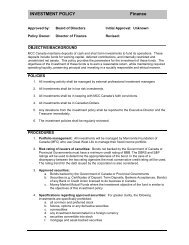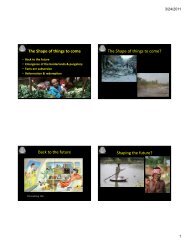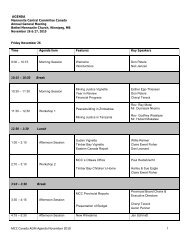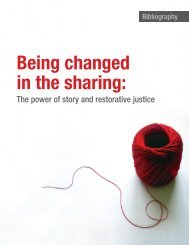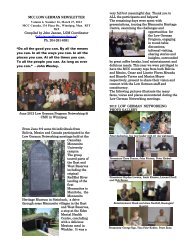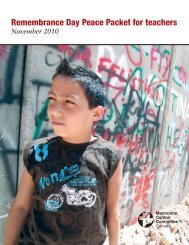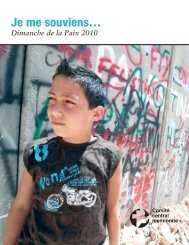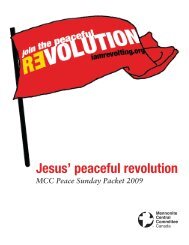Walking together: Healing and hope for Colombian refugees
Walking together: Healing and hope for Colombian refugees
Walking together: Healing and hope for Colombian refugees
Create successful ePaper yourself
Turn your PDF publications into a flip-book with our unique Google optimized e-Paper software.
w a l k i n g<br />
t o g e t h e r<br />
63<br />
FLASHBACKS<br />
When memories from the past return<br />
It is likely that members of the refugee family will experience flashbacks on occasion after arriving in<br />
Canada. Because of your important role in supporting the refugee family it may be helpful <strong>for</strong> you to<br />
underst<strong>and</strong> flashbacks so that you can reassure the refugee family <strong>and</strong> give them guidance on how<br />
to deal with them. The following paragraphs have been adapted from the STAR program material on<br />
flashbacks. 19<br />
In normal, daily life the rational brain (cerebral cortex) is largely in charge until something happens that<br />
causes the instinctual <strong>and</strong>/or emotional parts of the brain (the limbic system <strong>and</strong> brain stem) to take<br />
over. To get back into the rational brain, a person must do something to “pull themselves <strong>together</strong>” so<br />
they can think clearly again <strong>and</strong> respond appropriately.<br />
<strong>Colombian</strong> Refugees share about experiencing flashbacks:<br />
“Memories - in the first year there is a lot<br />
of fear. Those unpleasant experiences live<br />
with you. When you go out on the street,<br />
you see a car <strong>and</strong> you react mechanically<br />
<strong>and</strong> you get frightened, but then you<br />
remember that you are in Canada <strong>and</strong><br />
you calm down.”<br />
- Filepe<br />
“I was walking in a park when someone<br />
spoke to me from behind, <strong>and</strong> it scared<br />
me so badly that I felt like I was re-living<br />
all of the experiences from Colombia. I<br />
felt a lot of fear in that moment. I kept<br />
walking but I felt like I was frozen <strong>and</strong><br />
couldn’t move. I looked behind <strong>and</strong> saw<br />
the person <strong>and</strong> I didn’t recognize his face,<br />
but then it turned out to be my friend.”<br />
- Sara<br />
“You try to not think about them again,<br />
because it’s something really ugly, something<br />
horrible. You ask God every day to <strong>for</strong>get those<br />
things. Sometimes I wake up dreaming that I’m<br />
there, I wake up afraid.”<br />
- Roberto<br />
“There are a lot of people here from the<br />
town that I come from. There is an ex-town<br />
councilor from my city. One day he called me.<br />
I was not happy to receive his call. The first<br />
thing that I thought was “if he lives here <strong>and</strong><br />
has my number...what is going on? what kind<br />
of connections does he have?”<br />
- Dora<br />
“Most of my memories are un<strong>for</strong>gettable.<br />
What do I do? - I keep the memories with me<br />
wherever I go.”<br />
- David<br />
19. Adapted from Flashbacks <strong>and</strong> the Brain-Body Link. (2004) Strategies <strong>for</strong> Trauma Resilience <strong>and</strong> Awareness (STAR), Eastern<br />
Mennonite University, Virginia, USA. www.emu.edu/star



